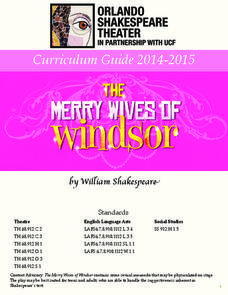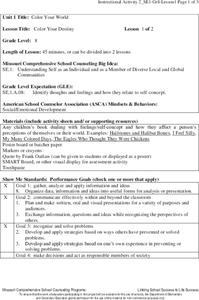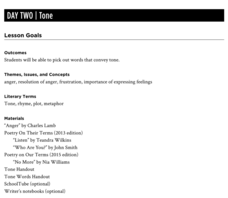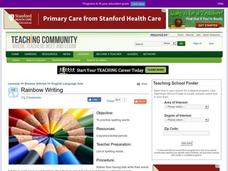Howard Hughes Medical Institute
Human Skin Color: Evidence for Selection
Skin color is controlled by at least six genes. Young scientists learn about skin colors through a documentary. They discuss the topics of pigment, natural selection, and vitamin D absorption. They apply their knowledge to higher order...
Curated OER
Lesson 3 - Lighting Design
The final lesson in a series on theatre design spotlights how lighting is incorporated into a production. After watching videos that focus on lighting fixtures and their positioning, individuals create a basic design plan for a scene,...
Orlando Shakes
Merry Wives of Windsor: Study Guide
What does the character Falstaff mean when he says "I was beaten myself into all the colors of the rainbow"? Using the Merry Wives of Windsor curriculum guide, scholars unlock meaning by paraphrasing lines from the play. Pupils also...
Biology Junction
Photosynthesis
Why do leaves change color in autumn? A presentation and worksheet walk through many details of photosynthesis. They explain where photosynthesis occurs, why plants are green, the changing colors in autumn, energy usage, and CAM plants.
Cold Spring Harbor Laboratory
Some DNA Does Not Encode Protein
Roy John Britten easily earned a PhD in nuclear physics—but he found painting with water colors too difficult. Young scientists learn about Britten's life, career, and research with an online interactive. They read a biography, view...
ABCya
Ball Ornaments Puzzle
Where have I seen that ornament before? A Christmas-themed game prompts players to search a pattern of colors for the specific pattern in a given ornament. Watch out—it gets tricky!
Alabama Wildlife Federation
Seed Necklace
Seeds come in many colors, shapes, and sizes—and that variety makes for a great necklace! Young learners collect a variety of seeds during their search in a nature area. An adult then prepares the seeds to better thread them onto a cord,...
Missouri Department of Elementary
Color Your Destiny
Class groups bring feeling words alive by creating a poster that illustrates with images and colors, but not words, the feeling conjured by the word. The posters are then combined into a mural for the classroom wall.
University of Colorado
Designing an Open Spectrograph
Take the class over the rainbow. Pairs or small groups follow directions to create a spectrograph. The pupils measure the angles formed by the different colors of the spectrum along with calculating the lengths formed by the spectrum and...
EngageNY
Mid-Unit 3 Assessment Part 1: Researching the Destruction Caused by the 1906 San Francisco Earthquake and Fires
How do you interpret that? Scholars work on their mid-unit assessments by interpreting resources pertaining to the 1906 San
Francisco Earthquake and Fires. Readers use the text in their research folders and complete graphic organizers,...
American Chemical Society
Chromatography - Color Clues
Here's an activity that will change how one sees color. Pupils try out an experiment on chromatography where they place a drop of food coloring on a coffee filter, add several drops of water, and watch the colors spread and separate....
American Chemical Society
Chemical Reactions and Color Change
Colors are more than just a pretty effect. Learners explore what color change means in terms of chemical properties and reactions. They create a pH solution using cabbage leaves and observe the changes when acids and bases are added.
American Chemical Society
Heat Up and Cool Down
Don't be so dense! Using food coloring, pupils conduct two experiments with the difference in densities of hot and cold water. In the first experiment, learners add dyed hot and cold water into room temperature water and observe how the...
EngageNY
Analysis, Reflection, and Introduction to the Painted Essay: The Invention of Television
Paint me a picture. Scholars complete a painted essay after examining the author's note in The Boy Who Invented TV. Learners identify various parts of the essay by using different paint colors and then complete task cards, using evidence...
EngageNY
Analyzing Images and Language: Inferring about the Natural Disaster in Eight Days
Pictures often reveal different meanings. Scholars analyze the images in Eight Days and discuss how they add meaning to the text. Readers answers questions about how specific colors are used to create different emotions. Learners then...
Franklin D. Roosevelt Presidential Library & Museum
The Power of Propaganda in Shaping Civic Actions and Understanding
Propaganda posters are powerful. Using images from The Art of War: American Poster Art 1941-1945 exhibit, young historians analyze the symbols, images, colors, and text used to rally support for World War II. Through seven activities,...
Curated OER
Tone
Identifying the tone in a piece of writing can be tricky. Readers don't have the advantage of studying the images and colors used in a painting or the instruments and sounds of a song. The second lesson in this poetry unit teaches tweens...
Curated OER
12 Red Apples: Numbers and Colors
In this number and color worksheet, pupils draw 12 apples on a tree, then color them red. The worksheet is a simple color/number recognition activity.
Curated OER
When Trees Are Red, Color in Remote Sensing
Student learn about "chromatography" in a hands-on experiment. Students make a chart showing what the colors represent.
Curated OER
Solar Hot Box
Students investigate how different colors and materials create various temperatures and apply this it the concept of solar energy.
Curated OER
Bubble-ology
Students observe the visible spectrum while observing light hitting the surface of bubbles. They blow large bubbles and observe how the colors change.
Curated OER
Rainbow Writing
Practice spelling words by experimenting with colors with young pupils. They will practice spelling different words by writing with 3-5 colors per word. Then they analyze the colors of a rainbow and utilize colored pencils or crayons to...
Oglebay Institute
Post-Impressionism: Mosaic Still-life
A still life with tissue paper? Why not! Using Paul Cézanne's art as inspiration, learners create their own still life pictures by gluing various colors of tissue paper onto a paper or pattern.
Curated OER
Vertical and Horizontal Lines
First graders view works from Mondrian such as "Composition with Red, Yellow and Blue" receiving explantion of the primary and secondary colors and the color wheel and vertical and horizontal lines. They glue black strips to the...
Other popular searches
- Primary Colors
- Spanish Colors
- Warm and Cool Colors
- Preschool Colors
- Secondary Colors
- Mixing Colors
- Color Mixing
- Teaching the Primary Colors
- Colors and Shapes
- Complementary Colors
- Colors Conveying Mood
- Cool Colors

























